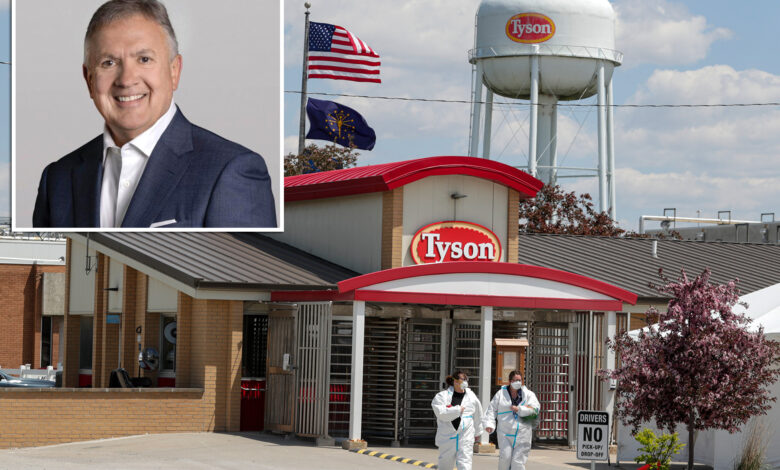Tyson Foods’ shares tumble 9% as inflation crimps meat demand

Shares of meatpacking giant Tyson plunged more than 9% — the stock’s worst day since August — after the company said persistent inflation weakened consumer appetites for beef, pork and chicken purchases, biting into profits in the second quarter.
At grocery stores, shoppers are prioritizing essential kitchen staples over discretionary categories thanks to persistent inflation that’s kept interest rates at their highest level in more than two decades, said Melanie Bouldin, who heads Tyson’s prepared foods business.
“The consumer is under pressure, especially the lower-income households,” Boulden told analysts on its latest earnings call, Bloomberg earlier reported.
Over the past three years, 20% cumulative inflation has led to a “more cautious, price-sensitive consumer” in retail, Boulden added.
Shares plunged as much as 9.4% in New York, to the lowest level since March, in the wake of the earnings call. The stock closed at $58.50, down 5.7%.
Chief Financial Officer John Tyson warned that uncertainties remain around consumer strength and behavior” as well around US cattle supplies and “key commodity costs,” according to Bloomberg.
Because of this, Tyson’s profits could continue to languish in the coming quarters.
The CFO sought to calm investor concerns over the third quarter outlook as shares sank, saying executives “don’t want anyone to over-read into that.”
For the latest three-month period ended March 30, Tyson said its quarterly sales slid 8.3% while volumes dropped 6.1%, largely due to reduced US production.
Adjusted net income, meanwhile, rang in at 62 cents a share, reversing a four cents-per-share loss the Arkansas-based company said in a statement issued Monday.
The second-quarter earnings were above analysts’ expectations for 39 cents, based on LSEG data.
The earnings rebound was driven primarily by the chicken business, Bloomberg reported, which has benefited from lower costs of feed.
Despite this, producers are still grappling with elevated chicken deaths and disease, Tyson CEO Donnie King said.
“We’re not where we need to be yet in our chicken business,” he added.
Tyson has shuttered six US chicken plants since the beginning of 2023, plus eliminated corporate employees and announced plans to close a pork plant in an attempt to boost results and rein in costs.
Improvement in the chicken business on Monday prompted Tyson to lift its estimate for total adjusted operating income range in fiscal year 2024 to between $1.4 billion and $1.8 billion — up from $1 billion to $1.5 billion.
The increased forecast and quarterly earnings were not overly surprising, Citi Research analyst Thomas Palmer said.
Tyson has worked to turn around its chicken business for years but struggled with excess supply in 2023. Adjusted operating margins were 3.9% in the latest quarter, compared to negative 3.7% a year earlier, as feed costs fell.
Tyson raised the chicken unit’s income outlook in the first such increase after the second quarter in seven years, JP Morgan said in a note.
With Post wires.




